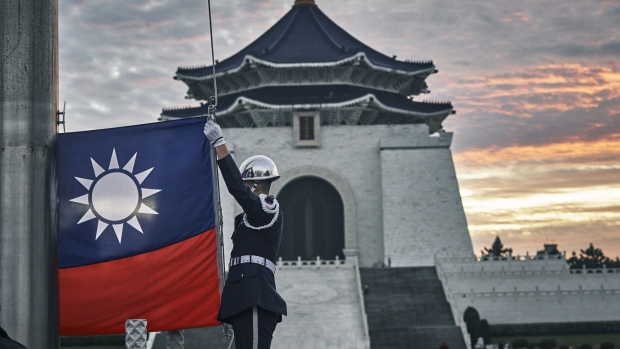Jan 11, 2024
Taiwan Doesn’t Expect Big China Military Drills Right After Vote
, Bloomberg News

(Bloomberg) -- Taiwan doesn’t expect China to carry out large military drills around the island immediately after the election but sees Beijing ramping up economic pressure and taking other coercive measures before the new president takes office in May.
Winter weather is a major reason the People’s Liberation Army probably won’t hold any big exercises in the Taiwan Strait for now, two security officials who asked not to be identified publicly discussing the matter said at a briefing in Taipei on Thursday.
They said Chinese military activity may pick up from March to April, as the weather gets better and just before the new president gets to work, the officials said, citing assessments based on past experience.
Beijing will also ramp up economic coercion and other pressure tactics in that period no matter who wins the election, the two security officials said. Those moves would be aimed at intensifying disagreement among Taiwan’s political parties.
It wants to discourage the new president by destabilizing the political situation, isolating the island globally and to influence the inauguration speech on May 20, they added.
Read: Taiwan’s Raucous Democracy Is Another Challenge to Xi’s Ambition
There has been some concern about China’s reaction to the election results, especially if Vice President Lai Ching-te of the ruling Democratic Progressive Party wins. Beijing has refused to hold high-level talks with President Tsai Ing-wen during her nearly eight years in power because she has refused to acknowledge its position that the island is part of China. Tsai is leaving office due to term limits.
Beijing has ordered major military exercises around the island of 23 million people twice since the autumn of 2022 because Tsai met with senior US lawmakers. In the first drills, which followed then-House Speaker Nancy Pelosi visiting Taipei, the People’s Liberation Army practiced a blockade of the island and sent missiles over the island.
China has also stepped up military pressure on Tsai’s government by sending sorties of warplanes into sensitive zones, including a record 103 aircraft in September last year after American officials visited Taiwan. It has also floated weather balloons over the island, and on Tuesday a Chinese satellite launch caused pre-election jitters when air raid alerts sounded across the island.
The two security officials said in the briefing that China may also be limited in its response to the election by its own domestic challenges, including a halting economic recovery, foreign outflows and a purge within the PLA’s ranks apparently related to corruption.
Beijing may also try to avoid doing anything that causes tensions with Washington as the world’s two largest economies take steps to improve ties that tumbled to new lows last year, the officials said. Operations that targeted at Taiwan’s domestic politics would be lower risk and prompt fewer international complaints, they said.
Taiwan would respond by making preparations to disclose relevant information to the public, the officials said. They’d also communicate with all parties involved, likely a reference to the US, Taiwan’s main military backer.
The Defense Ministry in Taipei regularly posts information about incursions by Chinese warplanes and naval vessels on X, the social media website formerly known as Twitter. It also recently started providing more information about balloon flights and satellite launches.
On Friday, the ministry indicated it was ready for any contingency, saying the armed forces were at “Full combat readiness.”
See: A War Over Taiwan Is a $10 Trillion Risk to the Global Economy
--With assistance from Argin Chang.
(Updates with post from Taiwan’s Defense Ministry.)
©2024 Bloomberg L.P.





